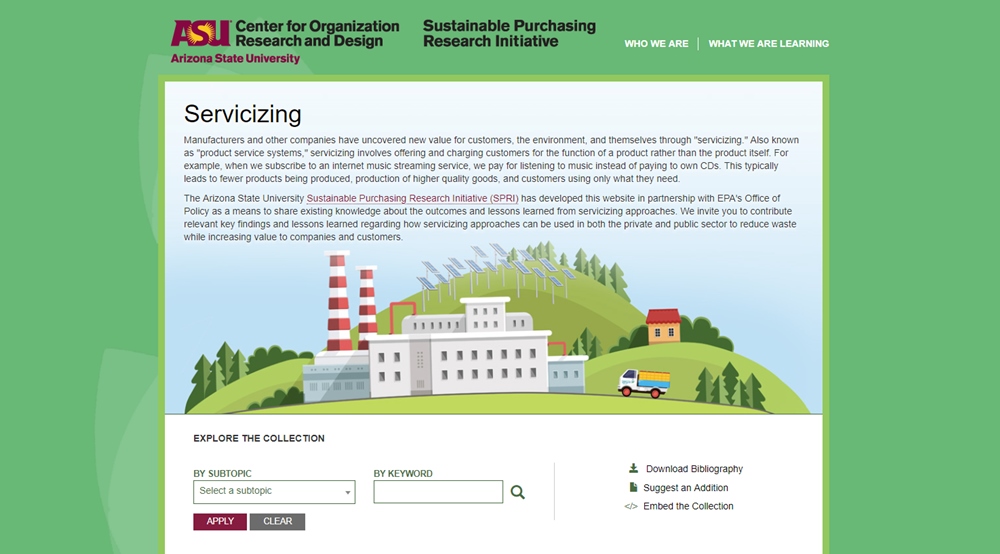ASU partners with EPA on sustainable purchasing website

ASU Professor Nicole Darnall is the lead researcher with the Sustainable Purchasing Research Initiative, a project that helps organizations adopt more eco-friendly purchasing policies and practices.
The Environmental Protection Agency is partnering with Arizona State University’s Sustainable Purchasing Research Initiative, or SPRI, on a website designed to help organizations interested in eco-friendly purchasing. Sustainablepurchasing.issuelab.org features a searchable database of research articles related to “servicizing,” a concept that is catching on worldwide and is endorsed by the United Nations Environmental Programme.
“Servicizing” promotes a more environmentally responsible way for businesses, nonprofits, governments and individuals to meet their purchasing needs. For example, instead of buying carpet, a “servicizing” approach would involve hiring a carpet leasing company to provide carpet as needed. This approach would eliminate overhead and disposal costs. Plus, the carpet leasing company would maintain control of its supply chain so that carpet that has reached the end of its “life” can be remanufactured and re-leased thus reducing waste sent to landfills.
"This new ‘servicizing’ approach offers and charges customers for the function of a product rather than the product itself,” said Lily Hsueh, an assistant professor in the ASU School of Public Affairs and researcher with the Center for Organization Research and Design. “Producers or vendors are the ‘owners’ of the products and consumers pay to be ‘users’ of the products.”
SPRI is a research initiative within ASU’s Center for Organization Research and Design (CORD).
“We are committed to helping organizations advance sustainable purchasing,” said SPRI’s lead researcher Nicole Darnall, a management and public policy professor. Earlier this year SPRI researchers examined the purchasing practices of local governments throughout the United States. The project promoted best practices using a website, video tips, social media, and webinars.
“The EPA partnership expands SPRI’s reach in an important way by highlighting the importance of service models as a means for organizations to advance sustainable purchasing,” Darnall said.
The EPA’s Office of Policy had been working on a similar website but opted to join forces with ASU because of changing administrative priorities.
“The project for us was about research — understanding the use of such a site as well as understanding environmental outcomes and financial implications of servicing approaches,” said Shari Grossarth, an environmental protection specialist at the EPA. “The whole project was about learning; SPRI’s mission is about learning and understanding, so SPRI seemed like a great home for the work.”
The SPRI website features a keyword search and allows for users to narrow searches by selecting an institution type or product category such as IT, medical or office management.

A screen capture of the Servicizing website shows the ability to search by subtopic or keyword.
“The servicizing website is an information clearinghouse,” Darnall said. “It is relevant to anyone who is interested in the topic. It sidesteps typical approaches to information gathering, such as the random internet searches.”
The EPA contracted with Industrial Economics, a public policy consulting firm, to conduct an initial review of the literature to populate the site.
As the website continues to develop, crowd-sourced information will be provided to users. It allows anyone to share knowledge or information about servicizing or recommend other resources to be added to the database using a simple online form.
Written by Bryce Newberry, contributing writer
More Environment and sustainability

Phosphate powers life as we know it; yet most of us flush it down the drain
Elemental phosphorus is too volatile to exist in nature.Expose a pure sample to air, and it could easily burst into flames. But…

Will rapid data center growth help Arizona? Examining the pros and cons
Arizona is engaged in a debate about where data centers should be built — with cities, developers and residents having varying…

How much will electric vehicles benefit Arizona? It depends on how well we plan
Electric vehicles are cheaper to refuel and more reliable in the long run than gas-powered cars and trucks.Experts predict that…